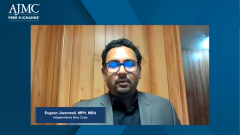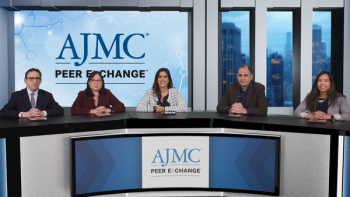
Future Outlook: Coverage for Comprehensive Genomic Profiling in Oncology
How payers will support the use of comprehensive genomic profiling in oncology moving forward.
Episodes in this series

Bruce Feinberg, DO: We talk about the testing, the time for testing itself, and the potential of 2 weeks, and then on top of that, the test not being ordered until there's prior authorization. And so, we start to get where the reflex concept takes it away because it's part and parcel to the pathologic analysis. Otherwise, you start to have a week or two for prior authorization, and then another 2 weeks for testing. At some point, you're no longer giving potentially the most effective therapy and if you're giving them a less effective therapy then you're paying not just for the treatment, but for the toxicity and the cost of managing it that shouldn't be a cost. How do we work that prior authorization piece into that future state?
Eugean Jiwanmall, MPH, MBA: I think I was planning on answering the future state piece of it and bring that into conversation. But I think we have reverted back to the reflux testing, so let me answer that part. I think it's going to be similar to that. The prior authorization in an emergency situation is never going to be the roadblock or the rate-limiting step.
Mark G. Kris, MD: As a clinician, I'll agree with that.
Eugean Jiwanmall, MPH, MBA: Thank you for that, Mark. What I want to cover is there are certain sequences and steps, as Mark has stated very nicely in a couple of answers, and follow the progression of what happened and how it becomes more definitive the advanced testing in the sequencing world …. And sequencing world when it comes to the clinical sensitivity and specificity, and the technical aspects.
All these conversations happened so I want to make sure that I'm not saying what the future is here for the reflux testing. But with that portion of it, there are mechanisms and pathways in place where the delay doesn't happen from a utilization management or from a plan determination perspective. You may not see it in policy writing all the time, but those are in place. That's more for the test portion which I would like to think and I'm pretty certain about this, and I hope this is the case. A majority of time that it's not the rate-limiting step is not us that there are going to be, you folks that go back and forth when you're trying to decide an emergent case.
That's the piece about that, but I just wanted to bring the conversation to the point about the future, where we are… but distinguishing between the commercial payer and the Medicare space, the CMS piece of it, because we do have something called the National Coverage Determination, NCD, before the investigation piece that we went through, and I was part of it from a perspective being part of panels , including a panel with the actual primary author of this. I've seen it developed over time.
In the medical space when you talk about it because we're talking about future of how are we go about this, so I will introduce a couple of concepts. When it comes to that NCD, there are nuances, butjust a quick history perspective. When the first draft came about, and then it was all about we're going to cover next. Part of that CGP conference genetic profiling is something called coverage and evidence.What Medicare was saying at that time was gather data, we'll pay for it. The federal government can bill for it because they recognize there was pushback, there were other things that went into it. And then you proceeded and are at a point—and I'm generalizing it—where the coverage is provided for stage III and stage IV cancer, irrespective of the cancer type.
This was a power review between FDA and CMS, Medicare coming together, Medicare and Medicaid services coming together, and actually developing that criterion. For certain tests, and they're different in their makeup, but they have achieved companion diagnostics. Certain pathways which are followed through where for a large population that is probably the best candidate for this. We're talking about the oncology world here where this would come into play.
Now, I'm not saying that this should be the case but what would happen at that time for those patient populations are that they're some of the more established testing in my world, in my terms, where the clinical validity has been established. There are clinical views that have been established. Those have been exhausted and you're already in there that patient needs treatment, we have exhausted a number of things that are out there. And now let's go for national genetic sequencing testing that is out there and you can get that when you stay informed. But there's an added piece to it. There are certain CGPs, certain large-panel tests or panel testing, which have provided data to a regulatory institution such as the FDA, where they were able to get a panel diagnostic for a patient. Or they were part of a review because they got approved by those.
Not saying that that is an absolute, but I wanted to introduce that concept because I believe that can be used as a prototype of how we fill all the gaps. Because there won’t be 100% agreement that every case is walking in. Every institution is different. Some institutions are going to be a go for every case comes in, they probably will get CGP. Maybe we will take that route in a few years because nobody would care about the cost. But everybody would get it. But we're not there yet. Maybe if we use a product as the concept, we'd make sure all payers are doing it but what they have done is and I would use this term very loosely, they cheated off that, where for our Medicare Advantage members that we must provide that coverage to CMS providers.
So, we have to provide their particular coverage, for the test of the layout, or the foundation and there's a few others that are out there. Again, not to endorse anything I'm just saying in general. But what the payers have done in that particular space in order to deal with this is they are using that as a base, as a prototype, and looking at the tests that are mentioned or use that particular concept and see if they have specific data for certain thresholds. I'm not saying they're very high thresholds of clinical usefulness. We will love to have perspective trials. Not everything is going to help prospective trials, but even the aggregation of the data, the quality may not be of the highest level all the time. But if it's answering something that I talked about in the beginning, ….which is objective…, it's achieving those, and there's aggregation of data over time you benefit. If there's a limitation of data….
Bruce Feinberg, DO: It sounds like this is more aspiration than it is necessarily what you think the future holds?
Eugean Jiwanmall, MPH, MBA: No. I would disagree, Bruce, because here’s the thing. The FDA and CMS put their heads together, this is over the years to deal with this and they were practical. They actually published, this is national coverage determination of what to do with it, so they go through the rationale of why they're providing it. They did not take all of the populations that are out there. They take lead space populations, because the rationale behind it and unfortunately, we don't have time for that but maybe all of us can get invited to another panel and we can talk about this. So, we actually went through a protocol and assessed this. This is the….piece that I was speaking of.
We were a bit more liberal, if I can use that term, and in my time, I will justify it but we picked certain population with the intervention which was this testing, using the comparators that were out there were able to achieve the outcomes so it was a whole strategy and rationalize assessment that actually happened so I would call it an aspiration to answer your piece. We already have examples. The commercial payers, we are not 100% aligned with those, but that's the direction it's going. Because, just like what I was trying to say earlier, technology is advancing, evidence is catching up to it. But we must come to a place where we reach common ground. And that's why I wouldn't categorize that as aspiration, but something practical that can be used for multiple stakeholders and discussions such as this, so we can thrive. What is it that we actually need in order to get comprehensive coverage for comprehensive genomic profiling?
Transcript edited for clarity.
Newsletter
Stay ahead of policy, cost, and value—subscribe to AJMC for expert insights at the intersection of clinical care and health economics.








